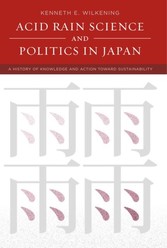Suchen und Finden
Acid Rain Science and Politics in Japan - A History of Knowledge and Action toward Sustainability
Mehr zum Inhalt

Acid Rain Science and Politics in Japan - A History of Knowledge and Action toward Sustainability
Acid Rain Science and Politics in Japan is a pioneering work in environmental and Asian history as well as an in-depth analysis of the influence of science on domestic and international environmental politics. Kenneth Wilkening's study also illuminates the global struggle to create sustainable societies.The Meiji Restoration of 1868 ended Japan's era of isolation- created self-sufficiency and sustainability. The opening of the country to Western ideas and technology not only brought pollution problems associated with industrialization (including acid rain) but also scientific techniques for understanding and combating them. Wilkening identifies three pollution-related "e,sustainability crises"e, in modern Japanese history: copper mining in the late nineteenth and early twentieth centuries, which spurred Japan's first acid rain research and policy initiatives, horrendous post-World War II domestic industrial pollution, which resulted in a "e,hidden"e, acid rain problem, and the present-day global problem of transboundary pollution, in which Japan is a victim of imported acid rain. He traces the country's scientific and policy responses to these crises through six distinct periods related to acid rain problems and argues that Japan's leadership role in East Asian acid rain science and policy today can be explained in large part by the "e,historical scientific momentum"e, generated by efforts to confront the issue since 1868, reinforced by Japan's cultural affinity with rain (its "e,culture of rain"e,). Wilkening provides an overview of nature, culture, and the acid rain problem in Japan to complement the general set of concepts he develops to analyze the interface of science and politics in environmental policymaking. He concludes with a discussion of lessons from Japan's experience that can be applied to the creation of sustainable societies worldwide.
Alle Preise verstehen sich inklusive der gesetzlichen MwSt.





